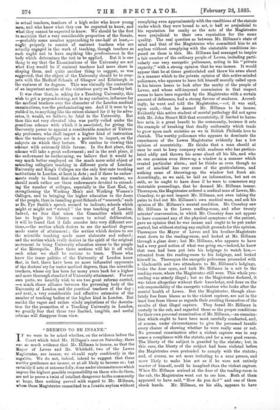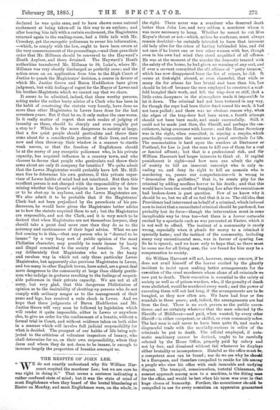"DEEMED TO BE INSANE."
IF we were to be asked whether, on the evidence before the Court which tried Mr. Hillman's case on Saturday, there was as much evidence that Mr. Hillman is insane, as that the Mayor of Lewes and Mr. Whitfield. two of the Lewes Magistrates, are insane, we sh euld reply confidently in the negative. We do not, indeed, intend to suggest that these worthy gentlemen are insane, or at all likely to become so ; but certainly if acts of extreme folly, done under circumstances which impose the highest possible responsibility on those who do 1hem, are not to prove a twist of intellect dangerous to the community at large, then nothing proved with regard to Mr. Hillman, whom these Magistrates committed to a lunatic. asylum without complying even approximately with the conditions of the statute under which they were bound to act, is half so prejudicial to his reputation for sanity as the acts of the Magistrates were prejudicial to their own reputation for the same quality. The real question as between Mr. Hillman's state of mind and that of the Magistrates who committed. him-to an asylum without complying with the statutable conditions imposed on them is this. Mr. Hillman had managed to inspire a fair number of the ordinary people of Lewes, including particularly one very energetic policeman, acting in his "private capacity," with a strong opinion that he was insane. It would appear that he at times gesticulated and threw his arms about in a manner which to the private opinion of this active-minded policeman, who appears to have felt himself morally called upon in his leisure hours to look after the sanity of the people of Lewes, and whose self-imposed commission in that respect seems to have been regarded by the Magistrates with a certain amount of deference, had a strong flavour of madness. Accordingly, he went and told the Magistrates,—not, it was said, upon oath,—that he deemed Mr. Hillman to be insane. Evidently this active student of mental pathology did not agree with Mr. John Stuart Mill that eccentricity, if limited to harmless acts, is a great benefit to the community, because it sets the example of breaking that deadly uniformity which tends to grow upon such societies as we in British Philistia love to cherish. The worthy policeman who appears to dominate the consciences of the Lewes Magistrates evidently has a low opinion of eccentricity. He thinks that a man should at once be sent to keep company with madmen who has gesticulated oddly and thrown his arms about all his life, and who on one occasion even threw-up a window in a manner which created particular alarm ; and he thinks so even though no sort of mischief has ever come of the gesticulations, and. nothing came of throwing-up the window but fresh air. Accordingly, as we said, he laid an information, but not on oath, as he ought to have done if he were to commence any statutable proceedings, that he deemed Mr. Hillman insane. Thereupon, the Magistrates ordered a medical man of Lewes, Mr. Croeskey, to go and inspect Mr. Hillman, not even taking the pains to find out Mr. Hillman's own medical man, and ask his opinion of Mr. Hillman's mental condition. Mr. Crosskey saw Mr. Hillman in the Lewes reading-room, and after twenty minutes' conversation, in which Mr. Crosskey does not appear to have examined any of the physical symptoms of the patient, gave an opinion that he was insane and ought to be put under control, but without stating any explicit grounds for this opinion. Thereupon the Mayor of Lewes and his brother-Magistrate went down to the reading-room, and looked at Mr. Hillman through a glass door; but Mr. Hillman, who appears to have had a very good notion of what was going on,—indeed, he knew that men had been put into his lodgings to watch him,— retreated from the reading-room to his lodgings, and locked himself in. Thereupon the energetic policeman proceeded with a blacksmith and two attendants to Mr. Hillman's lodgings, broke the door open, and took Mr. Hillman in a cab. to the reading-room, where the Magistrates still were. This whole proceeding was utterly illegal ; but as the Magistrates declared, it was taken altogether without their knowledge, and done on the • sole responsibility of the energetic volunteer who looks after the mental health of Lewes. But the Magistrates, though absolutely free from blame as to the violent capture, are not in the least free from blame as regards their availing themselves of the results of that illegal capture. They found Mr. Hillman in custody in the cab, and regarded these as the proper conditions for their own personal examination of Mr. Hillman,—an examination which ought to have been most carefully conducted, and, of course, under circumstances to give the presumed lunatic every chance of showing whether he were really sane or not. No personal examination after a violent capture was in any sense a compliance with the statute, and. for a very good reason. The liberty of the subject is guarded by.the statute ; bat, in this case, the liberty of the subject had been violated before the Magistrates even pretended to comply with the statute; and, of course, no act more irritating to a sane person, and more likely to make him act as if he were not entirely master of himself, could be imagined than the violent capture. When Mr. Hillman arrived at the door of the reading-room in the cab, the Magistrates went out to see him. Both of them appeared to have said, "How do you do ? " and one of them shook hands. Mr. Hillman, on his side, appears to have declared he was quite sane, and to have shown some natural excitement at being taken-off in this way to an asylum ; and after hearing him talk with a certain excitement, the Magistrates returned again to the reading-room, had a little talk with Mr. Crosskey, got the energetic policeman to swear his information, —which, to comply with the law, ought to have been sworn at the very commencement of the proceedings,—and then gave their order that Mr. Hillman should be conveyed to the Hayward's Heath Asylum, and there detained. The Hayward's Heath authorities transferred dr. Hillman to St. Luke's, where Mr. Hillman was very shortly discharged as perfectly sane; and the action arose on an application from him to the High Court of Justice to quash the Magistrates' decision, a course in favour of which Mr. Justice Grove and Baron Huddleston have given judgment, but with feelings of regret for the Mayor of Lewes and his brother-Magistrate which we cannot say that we share.
It seems to be admitted, indeed, that these worthy persons, acting under the rather hasty advice of a Clerk who has been in the habit of construing the statute very loosely, have done no more than other Magistrates in Lewes have done for the last seventeen years. But if that be so, it only makes the case worse. Is it really matter of regret that such modes of judging of insanity as these, should be sharply and even roughly put a stop to ? Which is the more dangerous to society at large, that a few quiet people should gesticulate and throw their arms about for a considerable portion of their lives; and even now and then throw-up their window, in a manner to startle. weak nerves, or that the, freedom of Englishmen should be at the mercy of any energetic policeman who, in his private capacity, has acquired influence in a country town, and who chooses to decree that people who gesticulate and throw their arms about are only fit company for lunatics P We quite admit that the Lewes Magistrates would probably have left Mr. Hillman free to determine his own gestures, if this private supervisor of Lewes habits of mind had not interfered. But then this excellent person is not charged with the responsibility of determiningwhether the Queen's subjects in Lewes are to be free or to be shut-up in asylums, and the Lewes Magistrates are. We also admit it to be probable that if the Magistrates' Clerk-had not been prejudiced by the precedents of his predecessors, he would have given the Magistrates better advice as to how the statute required them to act ; but the Magistrates are responsible, and not the Clerk, and it is very much to be desired that when Magistrates are not themselves lawyers, they should take a great deal more care than they do as to the accuracy and cautiousness of their legal advice. What we are fast coming to is this,—that any person who is "deemed to be insane" by a very hazy sort of public opinion of the most Philistine character, may possibly be made insane by hasty and illegal committal to the society of lunatics. Now, we say deliberately that Magistrates who act in the hasty and careless way in which not only these particular Lewes Magistrates, but apparently also previous Magistrates in Lewes, and too many in other English towns, have acted, are a great deal more dangerous to the community at large than elderly gentlemen who indulge in gestures revolting to the feelings of respectable policemen in their private capacity. We are not at all sorry, bat very glad, that this dangerous Philistinism of opinion as to the desirability of shutting-op persons who do not comply with ordinary usages as to the management of their arms and legs, has received a rude shock in Lewes. And we hope that these judgments of Baron Huddleston and Mr. Justice Grove will very soon be followed by legislation which will render it quite impossible, either in Lewes or anywhere else, to give an order for the confinement of a lunatic, without a formal trial in Court, and without evidence taken on both sides in a manner which will involve fall judicial responsibility for what is decided. The prospect of our habits of life being subjected to the criticism of volunteer inspectors of lunacy, who shall determine for us, on their own responsibility, whom they deem and whom they do not. deem to be insane, is enough to increase largely the proportion of lunatics amongst us.



































 Previous page
Previous page